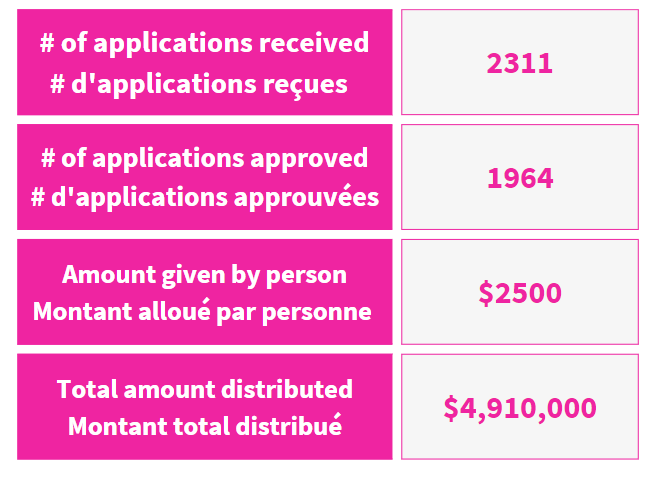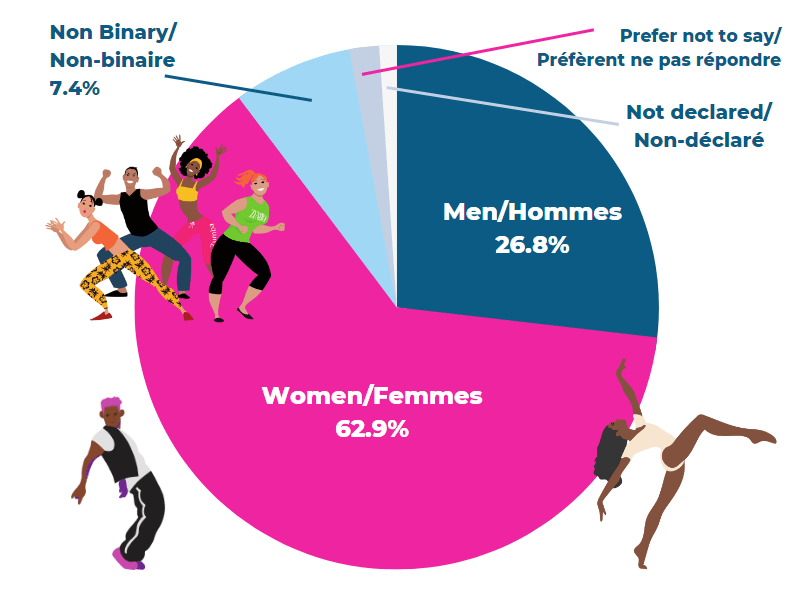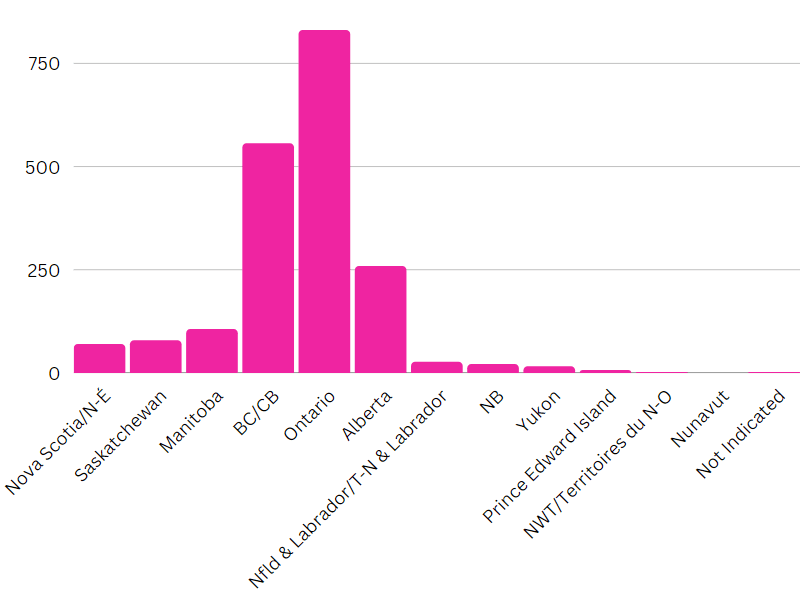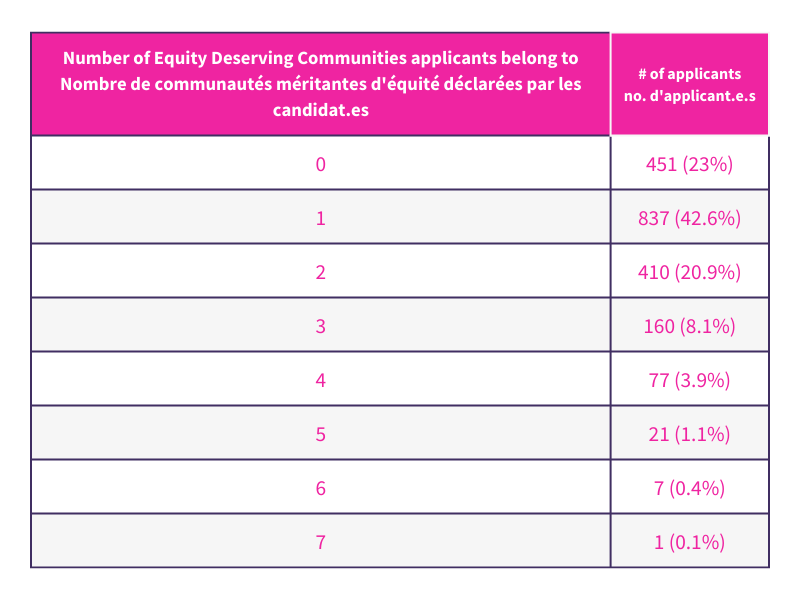The Canadian Dance Assembly (CDA) was awarded $3.88 million dollars in April 2022 as part of the Canadian Performing Arts Workers Resilience Fund (CPAWRF), administered by Heritage Canada to support performing dancers.
While CDA was initially awarded $3.88 million in funding, in December 2022 we received a supplement of $180,000, and a second supplement in February 2023 of $1 million dollars. This allowed us to increase our initial target of supporting 1510 dancers, to 1964 dancers.
Each successful applicant was eligible for a one time payment of $2500.
CDA’s main goals for this project were developed in consultation with the Advisory Committee and focused on equity and accessibility. It was decided to prioritize those who were hardest hit by the pandemic, and those who are chronically marginalized : IBPOC, racialized people, 2SLGBTQIA+, deaf people, people with disabilities, official minority language speakers, people living in rural and underserved areas, and to do so with an intersectional approach to best serve dancers deserving equity and access.
It was also a priority to show trust and honour to the dance community, and try to eliminate feelings of shame that often come with requesting financial aid. CDA aimed to do this by being transparent, and removing as many barriers as possible to access the funds. Finally, as one of CDA’s core values is care for the dance community as well as ourselves, we also let these values guide our processes and decision making.
Below are a number of tables that show the overall Resilience Fund statistics, broken down by gender, region, equity deserving communities, and intersectionality.
Unfortunately, CDA did not request information about what kind of dance applicants perform, which in hindsight is a question we would have included on the application form.
Read Full Report Here


Overall, the majority of applicants were women (62.9%), followed by men (26.8%), then Non-Binary people (7.4%). 1.8% of applicants preferred not to identify their gender, and the gender of 1.1% applicants was not included in any of these groups. Some of the manual entries include Trans Woman, bi-gender, multigender, gender fluid, and gender queer.

*Quebec dancers were served by La Fondation des artistes du Québec.

*Note the Indigenous category includes statistics we collected from Métis, Inuit, and First Nations applicants.
Not Listed manual entries include Plus Size/Fat Performer, Neurodivergent, Living with chronic pain, PTSD, ADHD, Mental Health Disorders, Survivor of Domestic Violence, Muslim, Legally Blind, and Multiracial, amongst others.
Although intersectionality is not a sandwich of different stacked barriers but a complex interweaving of them, we still found it useful to compile these data.

Of our successful 1,964 applicants, only 451 (23%) do not identify as belonging to any equity deserving communities. The largest number of applicants identify as belonging to one equity deserving community (42.6%), with the numbers getting lower as more groups are identified. There were 7 applicants (0.4%) who identified as belonging to 6 equity deserving communities, and 1 applicant who identified as belonging to 7 (0.1%).
As a method of measuring CDA’s success in achieving our goals, we circulated a Dancer Feedback Survey to all applicants to the Resilience Fund.
- The large majority of respondents (81%) felt the application form was very accessible.
- The majority of respondents (75%) felt they did not experience barriers to applying. Multiple respondents identified the closures of the application portal as a barrier, and a few mentioned being hesitant to apply because of various social and personal factors. One respondent mentioned that the need to include an artist’s resume was a barrier for some Indigenous applicants, as they did not understand the need for one.
- 75% of respondents felt the eligibility criteria was understandable.
- 80% of respondents felt they received responses to their applications within a reasonable amount of time.
- 77% of applicants felt the eligibility criteria was fair. Some additional comments mention groups missing from the list of equity deserving communities, but there was a space on the application form to enter any equity groups not listed, which CDA included in our overall statistics. There were also a few comments from respondents who disagreed with prioritizing equity deserving communities for the fund.
- 73% felt the general information was easy to find.
Overall the majority of the feedback we received was positive, and dancers were extremely thankful for this support after the challenges they faced with COVID19. One recurring theme we noticed in our correspondence with dancers and in our Dancer Feedback Survey, was that more support is needed. While this fund provided some temporary relief, many dancers let us know how difficult it is to make a living as an independent artist.
- Just that I am EXTREMELY grateful for the support and feel really really lucky and cared for, recognized and appreciated and this doesn’t happen often for me, so thank you!
- Miigwech for the financial support!
- Thank you for going up and beyond for artists in situations like myself. I love what I do and I wish barriers wouldn’t be in so much places for artists, for immigrants who can legally work in Canada. Hopefully these barriers can change Art and Art opportunities is not meant to be limited to the world.
- Thank you so much for making this the easiest application I have ever submitted. I felt seen and supported. With deep gratitude. It was so nice to receive the support.
- I can not be more grateful for the teams work on this — it was essential support and the process was deeply respectful and kind — absolutely flawless application and overall management of this very vital and “real” support.
- Thank you for offering access to this fund with efficiency, generosity and community-based ambition!
We would like to heartily thank the partner organizations and the members of the advisory committee. Their input is invaluable and essential to ensure that we proceed in accordance with our values of care, equity and access.
Members of the Advisory Committee:
Zorya Arrow, Heath Berkholz, Amy Hampton, Leelee Oluwatoyosi Eko Davis, Calla Lachance, Liliona Quarmyne, Bobbi Westman, Ziyian Kwan, Charles Smith, Jessica Wadsworth
Partner Organizations:
Alberta Dance Alliance, Dance Umbrella of Ontario (DUO), Cultural Pluralism in the Arts Movement Ontario (CPAMO), Studio 303, Dancers Transition Resource Centre (DTRC), CADA-West, CADA-EAST, The Dance Center, Dance Saskatchewan, Dance West Network, Young Lungs Dance Exchange, Dance Nova Scotia, DanceNL, Neighbourhood Dance Works, Kinetic Studio, Association Acadienne des artistes professionnels le. s du NB, Dance Immersion, Dance Ontario, The Dance Health Alliance of Canada, Indigenous Performing Arts Alliance (IPAA), Yukon Arts Centre, TO Love-In, Dancers of Damelahamid, Propeller Dance
In the name of Canadian dancers, we thank Canadian Heritage and the Government of Canada.

